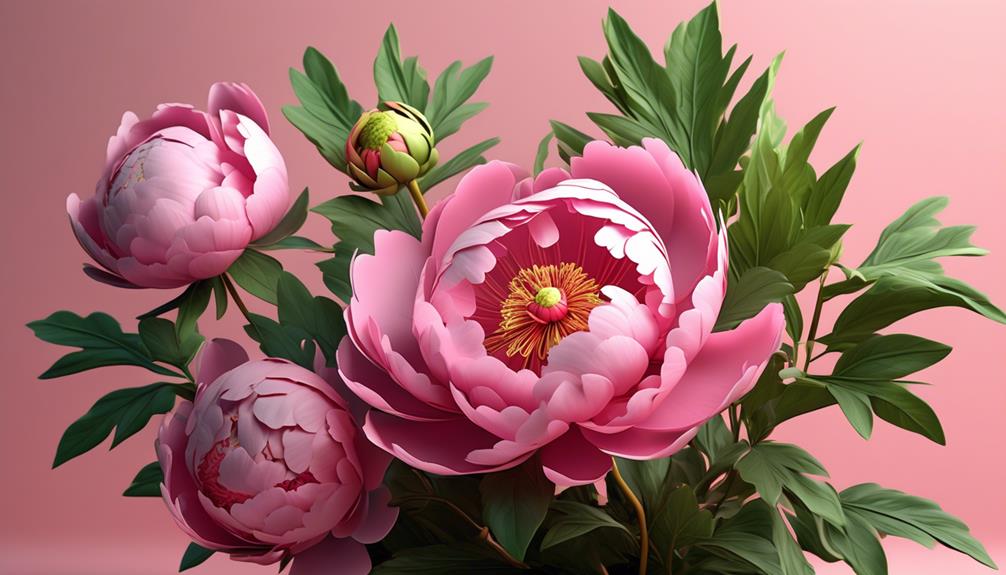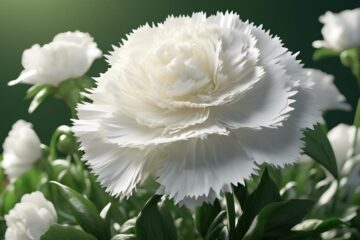Step into the enchanting world of 'Peony's Promise: The Bloom of Prosperity and Bashfulness', where the delicate dance of nature and human experience intertwine.
Explore the hidden depths of this exquisite flower, as we unravel its secrets and uncover the profound meanings it holds.
Discover the challenges that lie in nurturing these blossoms, and the rewards that await those who patiently tend to their growth.
But that's just the beginning; there is so much more to unravel, so many stories to be told.
Are you ready to embark on this captivating journey?
Peony's Historical Significance
Peony's historical significance spans across centuries, as this revered flower has been cherished in both Asian and European cultures for its symbolism of wealth, prosperity, and honor.
In traditional Chinese medicine, the peony has been used for its healing properties, and it's believed to have been inspired by the Chinese name for peony, 'sho-yu.'
This traditional flower has a rich history, dating back to around 1,000 BC when it first appeared in Chinese gardens. It quickly became associated with wealth and royalty and was cultivated in Japan, France, and England. In fact, the peony is the state flower of Indiana, USA.
Its beauty and symbolism have made it a favorite in the Imperial courts and it's now considered the national flower of China. With its vibrant blooms in June, the peony continues to captivate people around the world.
Story and Origins
As we delve into the story and origins of the peony, we uncover a fascinating narrative that intertwines mythology, cultural traditions, and the profound human experience.
In Chinese culture, peonies hold great significance and are revered as the 'King of Flowers.' According to legend, peonies were believed to be the favorite flowers of the Greek God of Medicine, Asclepius. Asclepius became jealous of the peonies' beauty and caused trouble, leading Zeus to transform them into a flower with multiple petals to protect them.
Since then, peonies have been used in traditional Chinese medicine for their healing properties and are considered a symbol of good fortune, prosperity, and perseverance. The blooming of peonies is a cherished event in Chinese culture, and their beauty continues to captivate and inspire people worldwide.
Peony's Cultural Significance
Peonies hold a significant place in various cultures, symbolizing prosperity, honor, and love throughout history. In Chinese culture, peonies are deeply rooted and highly regarded. They are often referred to as the "king of flowers" and are considered the national floral emblem of China. Peonies have been depicted in Chinese art for centuries, representing wealth, power, and class. These beautiful blooms continue to be used in feng shui to attract love and romance. In Victorian times, peonies symbolized bashfulness and were associated with love. Their cultural significance extends beyond symbolism, as peonies also hold medicinal properties and are used in traditional Chinese medicine. With their vibrant colors and delicate petals, peonies are a popular choice for weddings and bouquets, symbolizing happiness, romance, honor, prosperity, and good fortune.
| Symbolism | Meaning |
|---|---|
| White | Bashfulness |
| Red | Love and passion |
| Yellow | New beginnings |
| Pink | Love and happiness |
Peony's Symbolic Meanings
Symbolizing various aspects of life and emotions, the peony holds rich symbolic meanings in different cultures and traditions.
In Chinese culture, the peony represents prosperity, good fortune, and honor. Its vibrant bloom is often associated with wealth and abundance.
In Western culture, peonies are linked to the 12th wedding anniversary and symbolize bashfulness and a happy marriage. They're believed to bring luck and joy to the couple.
Peonies are also associated with new beginnings and optimism, particularly the yellow variety.
The peony's symbolic meanings extend to its colors as well. White peonies represent shyness and apology, while red ones symbolize love and joy.
As the peony flowers outdoors from late spring to early summer, they bring a sense of renewal and the promise of new beginnings.
These symbolic meanings have made peonies cherished flowers in countries like France and England, where they're often used in celebrations and special occasions.
Peony Care Tips
Now let's turn our attention to caring for peonies to ensure their long-lasting beauty and fragrance. Follow these peony care tips to keep your plants thriving during the growing season and maximize their vase life.
| Peony Care Tips |
|---|
| Choose healthy stems |
| Trim diagonally |
| Place in room temperature water |
| Keep away from direct sunlight |
Peonies bloom in late spring to early summer, producing stunning double blooms in various colors. In Chinese culture, peonies symbolize happiness in marriage and are considered the bloom of prosperity. To care for your peonies, start by selecting stems that are free from damage or disease. When preparing them for a vase, trim the stems at a diagonal angle to allow for better water absorption. Place the stems in a vase filled with room temperature water and change the water every few days to prevent bacteria growth. Lastly, keep your peonies away from direct sunlight to prolong their vase life and enjoy their beauty for longer.
Perfect Wedding Gift
Looking for the perfect wedding gift? Consider the timeless beauty and meaningful symbolism of peonies. With their vibrant blooms and rich history, peonies make a thoughtful and memorable gift for newlyweds. Symbolizing prosperity and bashfulness, these flowers represent the hopes and wishes for a prosperous and loving marriage.
Whether you choose popular varieties like Sarah Bernhardt or Coral Charm, or opt for unique options like Bartzella or Duchesse De Nemours, peonies are sure to impress. Their longevity, lasting up to 100 years, mirrors the couple's desire for a lifelong commitment.
Furthermore, peonies are deer-resistant and attract pollinators, adding natural beauty and charm to any garden. Give the gift of peonies and let their enchanting blooms convey your heartfelt blessings for the couple's happily ever after.
Concluding Thought
As we come to the end of our exploration of the perfect wedding gift, let us now reflect on the lasting impact and heartfelt blessings that peonies bring to a couple's happily ever after. The Paeonia, more commonly known as peonies, bloom from late spring to early summer, symbolizing the bloom of prosperity and bashfulness. These exquisite flowers captivate our hearts with their beauty and fragrance, evoking a sense of enchantment and romance. Like a love that is still in bud, peonies hold the promise of a blossoming future, filled with joy and abundance. In Chinese culture, peonies are cherished as a symbol of good fortune and marital bliss. As we conclude this journey, let the essence of peonies inspire you to embrace love, celebrate prosperity, and treasure the moments of bashfulness that make life truly special.
| Column 1 | Column 2 | Column 3 |
|---|---|---|
| Prosperity | Bashfulness | Enchantment |
| Romance | Fragrance | Abundance |
| Good fortune | Marital bliss | Joy |
Frequently Asked Questions
What Does the Peony Flower Symbolize?
The peony flower symbolizes happiness, romance, bashfulness, a happy marriage, honor, prosperity, good fortune, and wealth. It is prized in Chinese culture for its associations with wealth, power, and class.
What Is the Negative Meaning of the Peony Flower?
The negative meaning of the peony flower? Well, it's all about bashfulness. Can you believe it? Such a beautiful bloom, but apparently it's associated with hiding mischievous nymphs. Who knew?
What Does the Peony Symbolize in Japan?
In Japan, the peony symbolizes honor, bravery, and good fortune. It represents wealth, prosperity, and respect. These beautiful flowers hold great cultural significance and are often seen as a symbol of good luck.
What Flowers Symbolize Bashfulness?
Pink and white peonies symbolize bashfulness, conveying a sense of modesty and reserve. Victorian era symbolism adds depth to their meaning. Choose these delicate blooms to express humility and shyness in floral arrangements.





